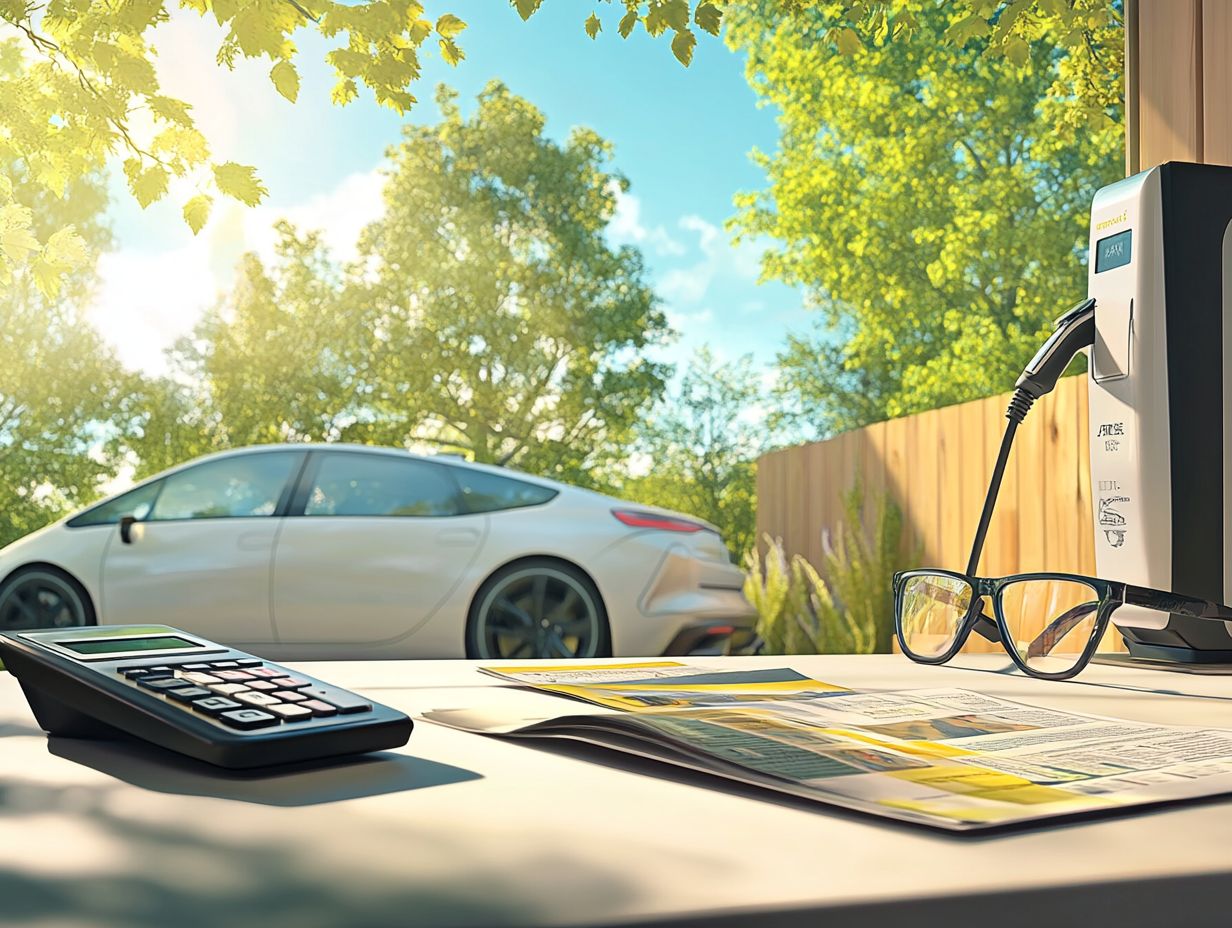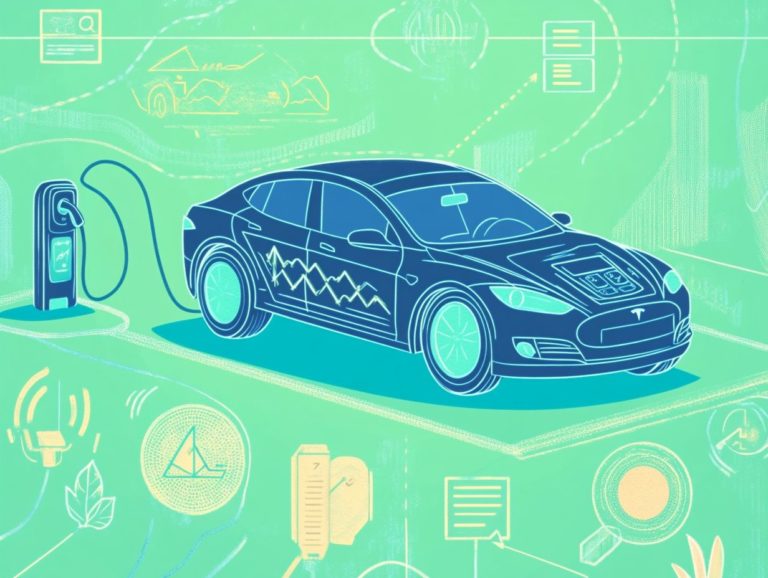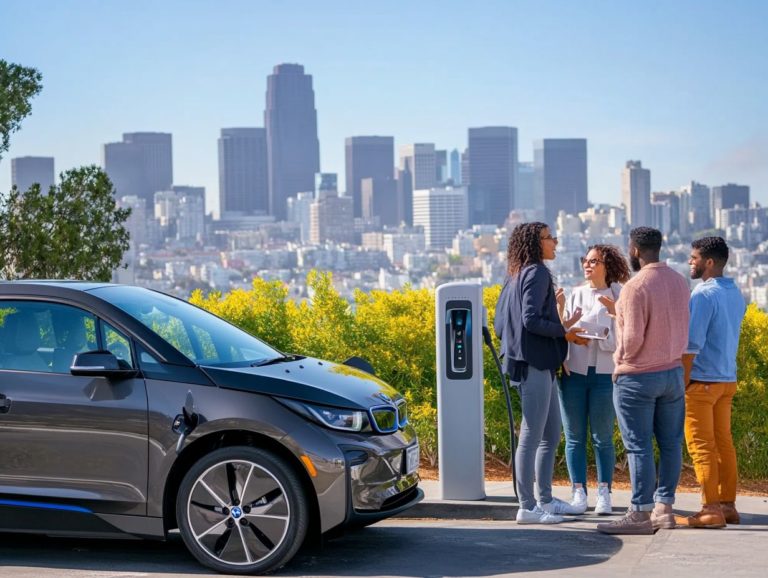are electric vehicle rebates worth it?
As the shift toward sustainable transportation picks up speed, electric vehicle (EV) rebates have emerged as a hot topic for you as a buyer. These financial incentives are designed to make EVs more accessible, and you might be asking: Are these rebates worth it?
This article breaks down what electric vehicle rebates entail, explores their advantages and disadvantages, and highlights key factors you should consider before applying.
It will also discuss alternative incentives that might complement or even replace rebates. If you re contemplating an EV purchase, this guide is here to help you navigate your options and make an informed decision.
Contents
- Key Takeaways:
- Overview of Electric Vehicle Rebates
- Pros and Cons of Electric Vehicle Rebates
- Factors to Consider Before Applying for Electric Vehicle Rebates
- Alternatives to Electric Vehicle Rebates
- Frequently Asked Questions
- What are electric vehicle rebates and why are they offered?
- How much money can I save with electric vehicle rebates?
- Who is eligible for electric vehicle rebates?
- Are there any drawbacks to applying for electric vehicle rebates?
- What types of expenses are covered by electric vehicle rebates?
- Are Electric Vehicle Rebates Worth It?
Key Takeaways:

Electric vehicle rebates offer financial incentives to encourage the adoption of eco-friendly transportation. Advantages of these rebates include cost savings, environmental benefits, and support for the electric vehicle industry. To maximize your benefits, look into how to leverage EV rebates for savings. Before applying for electric vehicle rebates, consider eligibility requirements and conduct a cost-benefit analysis to determine if it is worth it for your individual situation.
Overview of Electric Vehicle Rebates
Electric vehicle rebates serve as financial incentives aimed at encouraging the adoption of clean vehicles. They play a significant role in reducing carbon emissions and transforming the supply chain across North America.
Initiatives include electric vehicle rebates as part of programs like the Inflation Reduction Act introduced by the Biden administration. This allows eligible vehicles including well-known models like the Tesla Model Y and Chevrolet Bolt to enjoy tax credits, which reduce the amount of money you owe in taxes and effectively lower your tax liability.
To take advantage of these incentives, factors such as vehicle assembly, battery sourcing, price caps, and specific income limits are essential. This framework ensures that a wide array of consumers can support the transition to electric mobility by 2024.
What are Electric Vehicle Rebates?
Electric vehicle rebates are financial incentives designed specifically for you, the savvy consumer who chooses to purchase or lease clean vehicles. These incentives help accelerate the shift towards a more sustainable transportation system.
By taking advantage of these rebates, you can lower the overall cost of ownership, making environmentally friendly options not just viable but also appealing to a wider audience.
There s a range of rebates available, from federal tax credits to state-specific incentives and local utility programs, each tailored to support different aspects of electric vehicle adoption.
The application process for these rebates can vary. It often requires you to provide documentation of your purchase or lease along with details about your vehicle. But don t let that deter you; these financial incentives can significantly reduce the upfront costs of going electric, influencing your decision and encouraging a move towards greener alternatives.
Essentially, the IRS plays a crucial role in administering federal tax credits, offering clear guidelines on eligibility and application methods. This encourages more individuals, like yourself, to consider making the switch to electric options and contribute to a more sustainable future.
Pros and Cons of Electric Vehicle Rebates
Electric vehicle rebates present a compelling array of advantages and challenges that can significantly shape your decisions as a consumer. Understanding how to apply for electric vehicle rebates can also influence government policy and impact the broader electric vehicle market.
While these incentives offer considerable financial savings through tax credits, they also come with hurdles, such as eligibility constraints tied to income limits and fluctuating manufacturer incentives that may shift over time.
Ready to explore electric vehicle rebates? Let’s get started on your journey to sustainability!
Advantages of Electric Vehicle Rebates

One of the standout perks of electric vehicle rebates is the substantial financial incentives they offer. This makes it easier for you to switch to clean vehicles.
These rebates significantly reduce upfront costs through generous tax credits. This eases your financial burdens and helps more people switch to electric vehicles.
You also enjoy long-term savings on fuel and maintenance since electric vehicles generally require less upkeep compared to traditional gas-powered cars.
Switching to electric benefits your wallet and contributes to a healthier environment by reducing carbon emissions. This factor resonates with eco-conscious buyers like yourself.
Ultimately, these compelling economic and ecological advantages encourage you to consider electric vehicles. They also play a vital role in the growth of the electric vehicle market, appealing to a diverse array of potential buyers.
Disadvantages of Electric Vehicle Rebates
Despite the appeal of electric vehicle rebates, there are notable disadvantages to consider. Eligibility and income limits may restrict access for some consumers.
Navigating the complex maze of tax credits can be quite challenging. Many potential buyers might discover they don t meet the necessary criteria.
The benefits of these rebates often dwindle for used electric vehicles. This leaves you with fewer options if you’re looking for more affordable alternatives.
Frequent shifts in government policies create uncertainty. This makes it hard to predict the financial incentives that may be available by the time you decide to purchase.
This complexity can be off-putting, potentially discouraging you from fully embracing electric vehicles.
Factors to Consider Before Applying for Electric Vehicle Rebates
Before you apply for electric vehicle rebates, it’s essential to weigh several critical factors.
Consider the eligibility requirements, income caps, and price cap on qualifying vehicles. These elements can profoundly impact your purchasing decision.
Eligibility Requirements
Eligibility requirements for electric vehicle rebates hinge on specific criteria. These criteria determine which vehicles qualify for tax credits and how individual income levels may restrict access to these incentives.
To qualify for these rebates, pay attention to important vehicle identification criteria set by the IRS. This includes the model year and battery capacity. Only fully electric vehicles or plug-in hybrids that meet certain efficiency standards will qualify.
As a prospective buyer, remember that income caps may limit access to these rebates based on your modified adjusted gross income (MAGI). These caps aim to direct incentives to those who stand to benefit most financially, promoting economic equity.
Cost-Benefit Analysis

Conducting a cost-benefit analysis for electric vehicle rebates enables you to grasp the financial implications of reducing tax liabilities. This includes available credit transfer options and commercial tax credits.
By carefully evaluating the potential savings from these tax credits, you gain a clearer picture of the overall costs associated with owning an electric vehicle. This includes not just the initial purchase price often mitigated by various incentives but also ongoing expenses like maintenance, charging infrastructure, and insurance premiums.
Understanding these financial dynamics sheds light on the long-term economic benefits. This makes it easier for you to justify your investment in sustainable transportation. It also keeps you informed about any potential drawbacks, such as the variability of state incentives and the upfront cost barrier linked to these vehicles.
Alternatives to Electric Vehicle Rebates
While electric vehicle rebates are a favored choice for encouraging the purchase of clean vehicles, don’t miss out on other great incentives. There are various alternative programs available that can also deliver substantial financial benefits for you and your business.
Take the first step towards sustainable driving explore your electric vehicle rebate options today!
Other Incentives and Programs
Beyond federal electric vehicle rebates, you’ll discover a treasure trove of incentives and programs designed to support your transition to clean vehicles. For example, the Oregon Clean Vehicle rebate program offers additional financial support for battery sourcing and adopting cleaner transportation options.
States like California offer initiatives that provide substantial rebates. These initiatives also grant you access to carpool lanes that allow multiple passengers and reduced registration fees, making owning an electric vehicle incredibly enticing.
Local businesses can benefit from programs like the Chicago EV Program. This program facilitates the installation of charging stations, ensuring that residents have convenient access to electric vehicles.
In Massachusetts, grants are available for small businesses looking to adopt electric fleets. This showcases a commitment not only to sustainable practices but also to invigorating the economy.
These varied programs highlight the growing recognition of electric vehicles as key players in creating a cleaner environment and reducing operational costs for both consumers and businesses.
Final Thoughts and Recommendations
Navigating the landscape of electric vehicle rebates and alternatives requires careful consideration and a solid understanding of available tax credits. Recommendations from climate advocates and the significant impact of clean vehicle adoption also play a crucial role in protecting our environment.
As you weigh your options, explore the various financial incentives that can ease the upfront costs of these eco-friendly choices. Look into local, state, and federal programs to maximize your savings on an electric vehicle purchase.
Talk to professionals or join community forums to get valuable insights from others who have made similar transitions. This not only equips you with important information but also helps cultivate a sense of community in an increasingly sustainable future.
Embracing these vehicles isn t just a personal decision; it s a collective step toward a cleaner planet.
Frequently Asked Questions

What are electric vehicle rebates and why are they offered?
Electric vehicle rebates are financial incentives provided by governments and organizations to encourage people to purchase electric vehicles. They promote the use of eco-friendly vehicles and help reduce emissions from traditional gas-powered cars.
How much money can I save with electric vehicle rebates?
The amount of money you can save with electric vehicle rebates varies depending on your location and the specific program you are applying for. In some areas, rebates can range from a few hundred dollars to several thousand dollars. It’s important to research and compare different programs, including the best electric vehicle incentives by state, to find the best savings for you.
Who is eligible for electric vehicle rebates?
Eligibility for electric vehicle rebates varies depending on location and program. Generally, those who purchase or lease a new electric vehicle are eligible, but some programs may have additional requirements, such as income limits. Check with your local government or organizations offering the rebates for specific eligibility criteria.
Are there any drawbacks to applying for electric vehicle rebates?
One potential drawback is that the application process can be time-consuming, and there may be a limited amount of funding available. This means that not everyone who applies may receive a rebate. Additionally, some programs may have restrictions on the type of electric vehicle that qualifies for the rebate.
What types of expenses are covered by electric vehicle rebates?
Electric vehicle rebates typically cover a portion of the cost of purchasing or leasing an electric vehicle. This can include the cost of the vehicle itself, as well as any necessary equipment for charging the vehicle. Some programs may also cover installation costs for charging stations, which are the places where you refuel your electric vehicle.
Are Electric Vehicle Rebates Worth It?
Electric vehicle rebates can save you a lot of money upfront. To maximize your savings, it’s essential to understand what you need to know about EV purchase rebates. They also help you save in the long run because electric vehicles use less energy and cost less to operate than gas-powered cars.
Many areas offer additional perks like tax credits and discounts on charging fees. This makes electric vehicles not just smart for your wallet, but also great for the environment!






